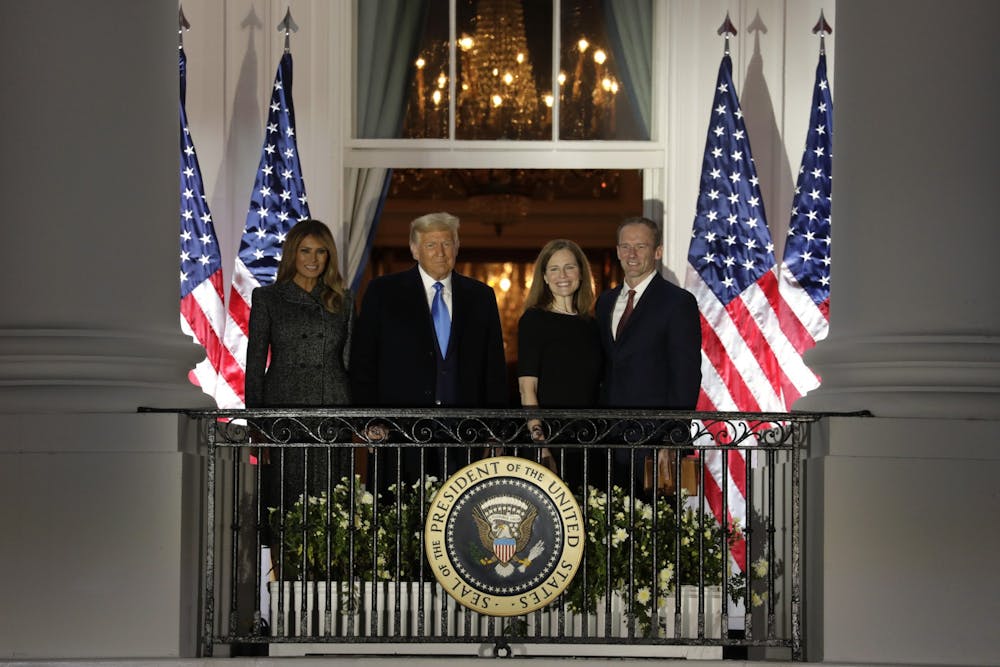On June 26, 2015, the Supreme Court of the United States legally recognized same-sex marriages. In the landmark case Obergefell v. Hodges the Supreme Court ruled that state bans on same-sex marriage are unconstitutional under the equal protection and due process clauses of the U.S. Constitution’s 14th Amendment.
Indiana Attorney General Curtis Hill took advantage of the new conservative majority on the Supreme Court and asked them to strip same-sex couples’ equal parenting rights in November. The new case, Box v. Henderson, could allow states to deny married same-sex couples the right to be legally recognized as parents of their children. The Supreme Court’s interest in taking up this case could be a starting point to overturn Obergefell v. Hodges.
The First Amendment’s establishment clause prohibits any branch of government from favoring the supposed beliefs of one religion over another, establishing the separation of church and state. Despite this, religious beliefs have always found their way into the U.S. government, especially concerning the rights of LGBTQ+ Americans.
After same-sex marriage became legalized, four justices wrote dissenting opinions on the ruling. Among these dissenting opinions, the topic of religious liberty was mentioned frequently. Associate Justice Samuel Alito supported “traditional marriage” in his dissent, claiming it was “inextricably linked” to reproduction. Additionally, he said the decision will be cause for vilifying “Americans who are unwilling to assent to the new orthodoxy.”
Undeniably, there are a few problems with the content of Alito’s dissenting opinion. He claimed the legalization of same sex marriage will infringe on procreation, conveniently ignoring the fact that many same-sex couples choose to have biological children through options such as artificial insemination and surrogacy. Nonetheless, heterosexuality is not a prerequisite for procreation as many opposite-sex couples may choose to not procreate or even adopt children, as many same-sex couples choose to do.
Ironically, the plaintiffs in Box v. Henderson are eight married lesbian couples who used sperm donors to conceive children through artificial insemination.
In Indiana, when a married lesbian couple uses a sperm donor, the state may refuse to recognize the birth mother’s wife as the child’s parent. However, when an opposite-sex couple does the same, the state immediately recognizes the birth mother’s husband as the child’s parent — regardless of the fact that he has no biological connection to the child. Despite Alito’s emphasis on procreation in his dissenting opinion, he is interested in taking up a case that may allow more states to discriminate against same-sex couples who conceive through artificial insemination.
Alito’s mention of religious liberty in his dissenting opinion is also problematic.
“Those who cling to old beliefs will be able to whisper their thoughts in the recesses of their homes, but if they repeat those views in public, they will risk being labeled as bigots and treated as such by governments, employers and schools,” he wrote.
I would like to counter Alito’s argument by posing a question: why should someone’s religious beliefs infringe on a same-sex couple’s right to get married?
While the biggest argument against same-sex marriage is rooted in religious belief, the biggest argument against same-sex parents is that children do not develop properly without both a mother and a father. Ellen C. Perrin, professor of pediatrics at Tufts University School of Medicine in Boston, refutes these claims.
“The vast consensus of all the studies shows that children of same-sex parents do as well as children whose parents are heterosexual in every way,” Perrin said in a 2005 interview for WebMD. “In some ways children of same sex parents actually may have advantages over other family structure.”
It is senseless to think that the government’s legal recognition of a same-sex couple’s marriage and parenthood is somehow physically or mentally oppressive toward individuals who do not support everyone’s right to marry.
The confirmation of Justice Amy Coney Barrett onto the Supreme Court is detrimental for the rights of same-sex couples and their children. If the new conservative majority plans on taking up the case of Box v. Henderson, couples may have to go through several legal ordeals in order to be recognized as parents of their own children. Furthermore, Box v. Henderson could be the Supreme Court’s starting point in chipping away at Obergefell v. Hodges.
This is sheer discrimination against individuals solely based on their sexual orientation, and it is unconstitutional. We will not stand for it.
Rama Sardar (she/her) is a freshman studying media and filmmaking. She aspires to become a film director and a screenwriter.






